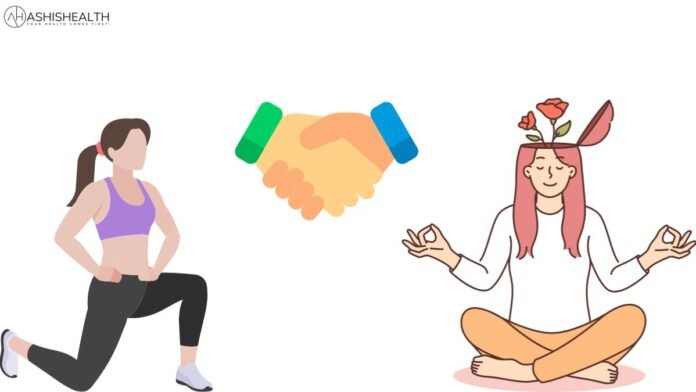In the fast-paced world we live in, prioritizing mental health has become more crucial than ever. As we explore the intricate web of Relationship between exercise and mental health one undeniable link stands out prominently – the profound relationship between mental health and physical exercise. In this article, we delve into the scientific nuances of this correlation, shedding light on how engaging in regular physical activity can significantly impact both your mental and physical health.
Understanding the Relationship Between Exercise and Mental Health
The relationship between exercise and mental health is a multifaceted interplay, where one directly influences the other. Research consistently highlights the positive effects of exercise on mental well-being. Regular physical activity has been shown to alleviate symptoms of stress, anxiety, and depression, acting as a powerful tool in maintaining a healthy mind.
The Science Behind It
Engaging in exercise triggers the release of endorphins, commonly known as “feel-good” hormones, which play a pivotal role in enhancing mood and reducing stress. Furthermore, physical activity promotes better sleep, which is integral to mental health. Adequate sleep contributes to improved cognitive function and emotional well-being.
Relationship Between Exercise and Mental Health
Exploring the relationship between exercise and mental health unveils a range of benefits. From boosting self-esteem and cognitive function to reducing symptoms in individuals with clinical conditions, the positive impact is undeniable. Exercise becomes a holistic approach to mental well-being, fostering a positive mindset and emotional resilience.
Key Benefits
Stress Reduction: Physical activity helps in managing stress by reducing cortisol levels and promoting a sense of relaxation.
Anxiety Alleviation: Exercise acts as a natural anxiety remedy, providing a constructive outlet for nervous energy.
Depression Management: Studies show that regular exercise can be as effective as medication in managing mild to moderate depression.
Cognitive Enhancement: Improved blood flow to the brain during exercise enhances cognitive function, positively impacting memory and concentration.
Creating a Routine
Incorporating physical activity into your daily routine doesn’t necessarily mean intense workouts. Simple activities like walking, jogging, or yoga can make a significant difference. Finding an exercise routine that suits your preferences and lifestyle is key to establishing a sustainable practice.
Getting Started With Exercises for Your Mental Health
Even if you’re not into intense workouts, regular physical activity can improve your mental well-being. Simple changes to your routine can make a big difference. Here are some tips for beginners to get started:
- Start small and gradually increase effort: Start with moderate exercise (30 min/day) and slowly increase the intensity and duration.
- Coordinate wellness into day-to-day existence: Integrate practice into your daily schedule, such as going for strolls during breaks, utilising steps rather than lifts, or doing bodyweight exercises at home.
- Track down enjoyable exercises: Take part in leisure activities or activities you enjoy for fun, like swimming, moving, or team activities.
- Get backing or responsibility: Consider joining a wellness class or finding an exercise accomplice for inspiration and support.
- Listen to your body: Rest when needed. Pushing too hard can lead to injuries.
Inclusion of Activities into Your Day-to-day Practice
Exercising shouldn’t for a second be an issue or take up a lot of your day. Here are a few basic hints to assist you with squeezing exercises into your everyday routine:
- Begin Slowly, Pick up Speed: Focus on consistency over force, and praise your accomplishments in the process. For those beginners or those battling with inspiration, begin with sensible objectives and continuously increase your efforts. Indeed, even concise activity meetings (e.g., 10 minutes day-to-day) can support your energy and state of mind.
- Focus on Taking Care of Oneself in Exercise: Pick exercises that cause you to feel enabled, revived, and empowered. Pay attention to your body’s signs and regard its requirements. Rather than survey practice as an errand, reevaluate it as a type of self-esteem and taking care of oneself.
- Embrace Exercises You Love: Picking pursuits that give you pleasure and fulfilment urges you to stay with them and receive their enduring emotional wellness rewards. Find exercises that light your interests, whether it’s stirring things up around town, jumping into the pool, or cutting to rhythms.
- Make It a Social Encounter: Join a games group, go to a bunch of wellness classes, or organise strolls with companions. Practising with others can make it more agreeable and fulfilling. This combines social interaction with physical activity.
By progressively expanding your activity level, you can fundamentally improve your general well-being and health. Try your best to integrate movement into your regular, everyday exercises. Simple things like deciding on steps over lifts or doing squats while brushing your teeth can all contribute.
Conclusion
In the intricate dance between mental and physical health, exercise emerges as a potent force that we can harness for our well-being. Acknowledging the link between mental health and physical exercise empowers us to take proactive steps towards a healthier, more balanced life. Let’s embrace the transformative power of movement and make it an integral part of our journey to holistic well-being.


